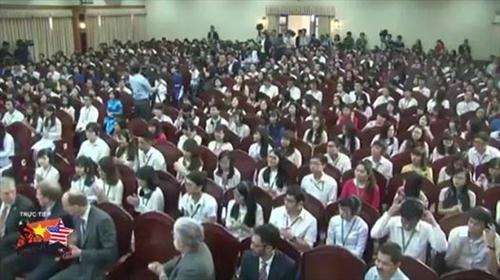
My Linh (3rd year student, Linguistics major) isgirl giving flowers to US President Barack Obamaon the evening of May 22 when he arrived at Noi Bai airport. Information aboutlucky girlThis is of interest to many young people.
Immediately after being invited to ask a question during the talk, Tran My Linh quickly raised her hand and was the first to ask a question. My Linh's question was highly appreciated by Deputy Secretary Blinken and many students in attendance.
"Hello Sir. My name is Linh, I am a third year student, Faculty of Linguistics. Thank you for your speech and I wonder if you would allow me to ask a question. Will the United States continue to maintain its engagement policy with the Asia-Pacific region? Thank you,"Tran My Linh asked a question.
My Linh's question received applause from many students in the hall and received thanks from Deputy Secretary Antony Blinken himself.
Deputy Secretary of State Blinken shared: “We will not only continue to maintain our engagement in the Asia-Pacific region, but we will also enhance and promote our engagement even more.
This is one of the top priorities of President Obama and Secretary of State John Kerry. We call it the rebalance. What that means is that we are focusing more and more time, more and more resources, more and more engagement right here in the Asia-Pacific region, and there are a number of reasons for doing that.
First, the United States is an Asia-Pacific nation, and that legacy, that history is not just a part of our past, it's fundamentally a part of our future. And that's because when we look around the Asia-Pacific region, we see some of the fastest-growing economies in the world. We see some of the youngest nations on the planet. We see some of the most innovative, connected, and dynamic people anywhere on Earth, and that's the future that we want to be a part of because it's good for the United States.
So we are making every effort to strengthen our engagement and relationships across the Asia-Pacific region. We are working to strengthen our partnerships with individual countries. Some of our traditional partners and allies are Japan, South Korea, the Philippines. But there are also emerging countries, new partners, first of all Vietnam.
We have been working to strengthen the institutions that already exist in the Asia-Pacific region and we need to look at new institutions, because institutions like ASEAN, APEC, the East Asia Summit and the Leaders' Forum provide opportunities for countries to come together, to discuss, to debate and to act together.
We have expanded our military presence in the region because we believe it is a factor in ensuring stability and helping to create an environment in which nations can grow and develop in peace.
As I said, we have worked hard to deepen our relationship and cooperation with China, because it is an important country for the future. As I said a few minutes ago, we have been successful in expanding and deepening that cooperation in important areas like climate change, responding to the Ebola virus, dealing with Iran's nuclear program, and even directly addressing our differences.
And we have worked to create new relationships, particularly in trade and business, that will connect us long into the future with this region, and that is where the Trans-Pacific Partnership will come into play.
When you look at all of these factors, it's about building a strong architecture of connections and networks between the United States and the entire region. So we're not only going to maintain that engagement, we're going to make it stronger, and it's going to be a big part of our shared future. Thank you."
Author:Nguyen Thao
Newer news
Older news